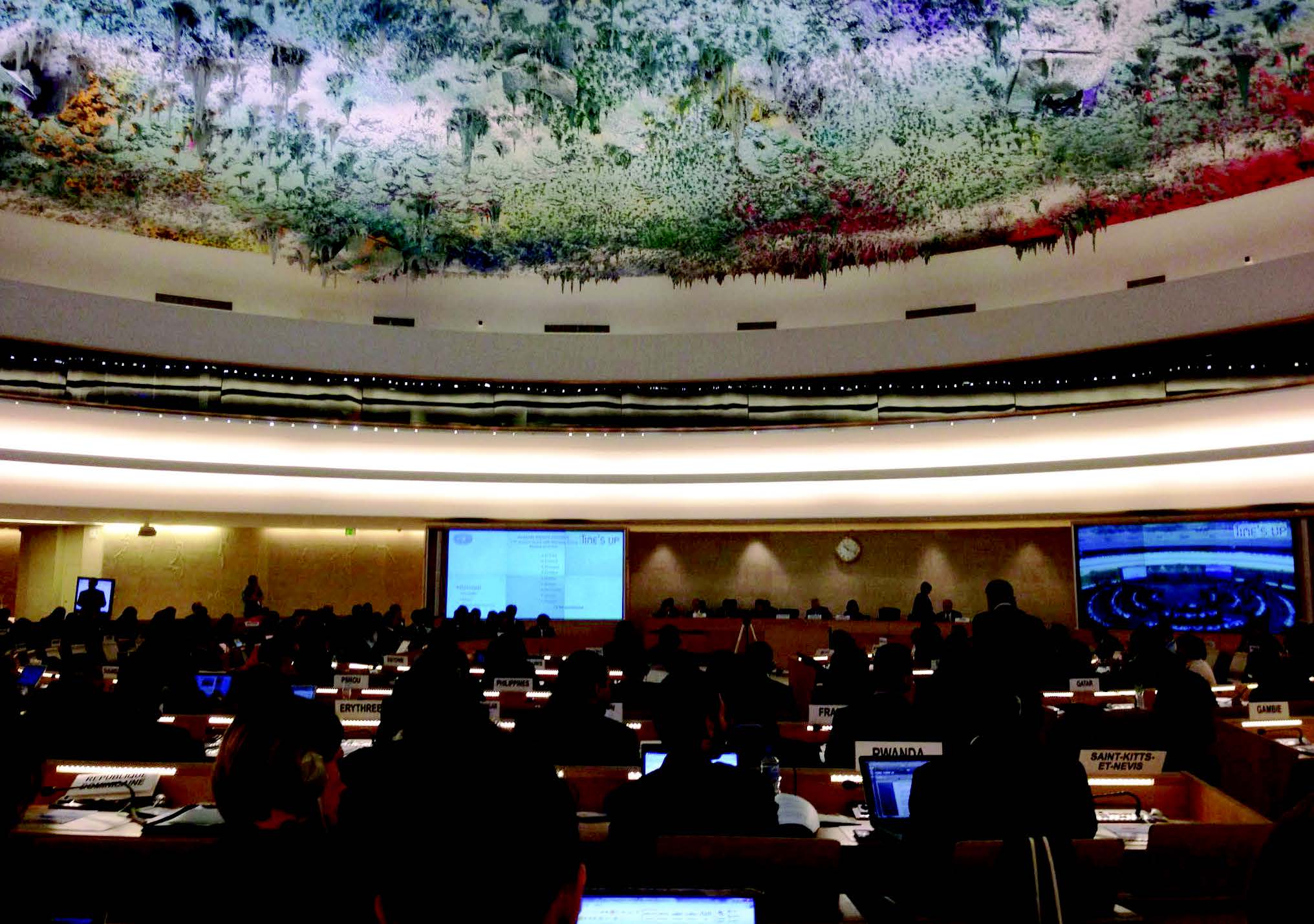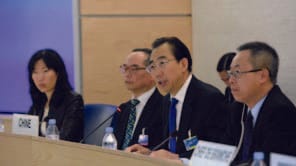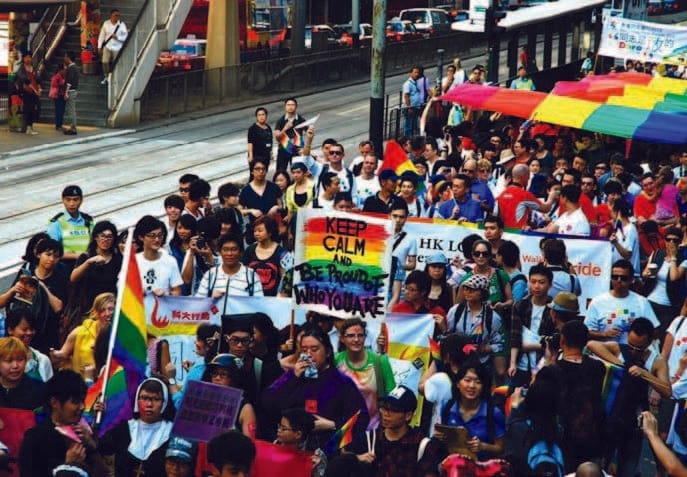
In a year of waning cooperation on human rights between China and foreign governments and international organizations, the 17th session of the Human Rights Council (HRC) Universal Periodic Review (UPR) provided an opportunity for open dialogue across a broad range of topics. On the morning of October 22, 2013, 137 countries gave statements on China’s human rights record. The troika of countries that facilitated the review process consisted of Poland, Sierra Leone, and United Arab Emirates.
Many declared China’s handling of its first UPR in February 2009 a brilliant stroke of political maneuvering. In order to make statements during that session, country representatives were required to queue and speak in order of their places in line. By the time the session concluded, only 60 countries—less than half of those who wanted to speak—had made remarks, and many of those countries had lined up hours in advance at China’s behest.
In an effort to remedy situations like this, the HRC instituted new UPR procedures. This year, the majority of countries were given the floor in alphabetical order (the first five spots were determined by lots), with each allowed just 50 seconds to speak. The result was a rapid-fire interactive dialogue bookended and interspersed with statements and responses from the Chinese delegation, led by Wu Hailong, special envoy of China’s Ministry of Foreign Affairs (MFA).
Opening Remarks
Wu’s introductory statement began with a commitment to the UPR process and “open, candid, and responsible” dialogue. He acknowledged the 42 recommendations accepted at the previous UPR and highlighted the steps China has taken to improve its human rights record.
With regard to the judicial system, these steps included reducing the number of crimes carrying the death penalty and reforming the system of reeducation through labor (RTL). Wu emphasized that Amendment 8 to the Criminal Law abolished the death penalty for 13 economic and non-violent crimes, but he did not offer statistics on the number of executions nor a commitment to complete abolition. In his mention of RTL—a decades-old form of administrative detention often applied to dissidents—he stated that a plan for reform was underway and would be announced in due course.

Acknowledging China’s agreement to step up cooperation with UN Special Procedures, a recommendation it accepted in 2009, Wu announced that China had issued an invitation to receive the Working Group on the Issue of Discrimination against Women in Law and in Practice later this year. Dui Hua lobbied for this landmark invitation, which comes at a time when China has about a dozen pending requests for visits by Special Procedures, the oldest of the requests dating back to 2005. China also indicated that it would welcome three other Special Procedures next year and increase its annual donation to the Office of the High Commissioner for Human Rights from US$50,000 to US$800,000. The revised figure puts China among the top 25 donors, just ahead of Japan, but is nonetheless dwarfed by the annual US contribution of US$48 million.
In its first UPR, China agreed to facilitate an early visit by the UN high commissioner on human rights. High Commissioner Navanethem Pillay has been in office for the last five years but has yet to visit China. In his statement, Wu reiterated that China would like to invite the high commissioner to visit at a mutually convenient time. Having made several critical statements on China’s human rights record, Pillay was only approved for an abbreviated two-year second term, and her mandate ends on September 1, 2014. Finding a mutually convenient time for Pillay to visit China will be difficult—partially due to a number of sensitive dates such as the National People’s Congress and Chinese People’s Political Consultative Conference, Chinese New Year, June Fourth, and Occupy Central (a civil disobedience movement for universal suffrage in Hong Kong scheduled to coincide with the July 1 Special Administrative Region Day)—but may be possible in April or May of 2014.
In his discussion of Hong Kong, Wu stated that the government continues to support individuals with different sexual orientation. In China’s 2009 UPR no recommendations were issued on the subject. This round Ireland recommended that China establish anti-discrimination laws to ensure equal treatment for lesbian, gay, bisexual, and transgender people, while the Netherlands recommended that anti-discrimination clauses be added to the labor law.
Recommendations
Reinforcing the universality of human rights as put forth in Article 1 of the Universal Declaration of Human Rights, ratification of the International Covenant on Civil and Political Rights (ICCPR) remained the action most recommended to China by member states, just as it was during China’s 2009 UPR. China signed the ICCPR in 1998, and while it accepted the 2009 recommendations to one day ratify the covenant, it rejected recommendations to either immediately ratify the treaty or provide a timetable for ratification. Acceptance or rejection of the recommendations made during the 17th session has not yet been indicated. China is expected to formally respond to the recommendations at the 25th session of the HRC in Geneva in March 2014.
In April of this year, the General Office of the Communist Party of China (CPC) issued Document No. 9 identifying “universal values of human rights” as one of “seven perils” faced by the CPC in maintaining its one-party system. Speaking last in the interactive dialogue of October’s UPR, Iceland emphasized the principle of the universality of human rights. It commended China for affirming that principle in its first National Human Rights Action Plan (2009‒2010) but expressed concern that the principle was trumped by “practicality” in the action plan for 2012‒2015.
The second most common type of recommendation at this year’s review involved the death penalty. While China’s reduction in the number of capital crimes was widely acknowledged, several European nations, among others, called on China to declare a moratorium on the death penalty and release execution statistics. In responses made by the Chinese delegation during the interactive dialogue, Miao Youshui, deputy presiding judge at the Supreme People’s Court, addressed the issue of capital punishment. He noted that the right to life must be balanced with guaranteeing the rights of the victim. According to the current situation and “people’s desire for justice” the death penalty cannot presently be abolished, but abolition is a trend that China is moving toward, Miao said.

Ethnic minorities were another major focus during the interactive dialogue. As country representatives arrived for China’s UPR, Tibet activists scaled the UN venue and unfurled a 9-meter-by-15-meter banner that read “China Fails Human Rights, UN: Stand Up for Tibet.” The banner was removed before the UPR actually commenced, and four of the activists were arrested by police. Countries critical of China’s ethnic policies recommended greater protections of political and religious rights, particularly for Tibetans, Uyghurs, and Mongolians. Canada called on China to stop the persecution of people for their religious practices and beliefs including Tibetans, Uyghurs, Catholics, other Christians, and Falun Gong.
In contrast, Uzbekistan asked China to step up measures to bring self-immolators to justice in Tibet, and Pakistan and Sri Lanka recommended continued counterterrorist action in Xinjiang. Liu Peng, director of the Seventh Department of the United Front Work Department of the CPC Central Committee, noted rapid economic growth and social developments, such as improved literacy rates and life expectancy, in Tibet. He blamed the “Dalai Lama clique” for organizing the more than 120 self-immolations carried out across the Tibetan plateau since February 2009, citing an online guide to self-immolation as evidence. Sui Qing, deputy director-general of the Department of Supervision of the State Ethnic Affairs Commission, said that Xinjiang is currently at its “best time” in economic and social development but that violent terrorist acts originated by East Turkestan have led to instability.
In defending its treatment of Tibetans and Uyghurs, the Chinese delegation cited equal participation between ethnic minorities and Han Chinese in state and local affairs. Yet the delegation’s leading experts on Tibet and Xinjiang were neither Tibetan nor Uyghur, which speaks to the larger issue of who is allowed to participate.
One month before the UPR, academic and human rights defender Cao Shunli (曹顺利) was detained at Beijing Capital International Airport en route to Geneva, where she intended to attend the HRC. Cao led a protest outside the MFA calling on the government to allow civil society a more robust role in the UPR. She was formally arrested on October 21. Many of the most critical countries at the UPR recommended that China establish a national human rights institution in line with the Paris Principles, and even more highlighted enforced disappearances and the detention of human rights defenders.
Naming Names
While rights abuses against human rights defenders and civil society practitioners were brought up repeatedly, throughout the entire session, only one of 137 countries included in its remarks the names of people believed to face these abuses. Speaking sixth to last, the United States expressed concern that China “harasses, detains, and punishes activists including Xu Zhiyong (许志永) and Yang Maodong (杨茂东)” (a.k.a. Guo Feixiong (郭飞雄)). Xu and Yang are leading members of the loosely organized New Citizens’ Movement that advocates for constitutionalism and anti-corruption measures. Despite their mention during the interactive dialogue, neither Xu’s nor Yang’s name appears in the draft report of the Working Group on the UPR, which was approved without objection by the United States. Names of six other individuals—Gao Zhisheng (高智晟), Liu Xiaobo (刘晓波), Liu Xia (刘霞), Dhondrup Wangchen, Jigme Gyatso, and Ghariyet Niyaz—were included in questions submitted by Sweden and the United States in advance of the UPR. With the possible exceptions of Yang and Jigme Gyatso, all of these individuals were among the 30 people identified during the 18th US-China Human Rights Dialogue as facing political persecution.

In China’s final remarks, Director-General Li Junhua of the MFA Department of International Organizations and Conferences countered that some countries “called certain criminals in China as human rights defenders” and that “normal judicial procedures were called political persecution.” Rights lawyer Gao Zhisheng, university professor and Nobel laureate Liu Xiaobo, and Tibetan filmmaker Dhondrup Wangchen are all currently serving prison sentences. Yang Maodong and Jigme Gyatso previously served prison sentences for providing legal aid to petitioners and carrying out peaceful resistance for Tibetan independence, respectively. However, neither Xu Zhiyong, who is currently in police custody, nor Liu Xia, who is under police surveillance, has ever been convicted of any crime.
In systems where human rights abuses persist, actions to protect human rights can often run afoul of the law, and “normal” judicial procedures may be flawed. It may be true, as Director-General Li Junhua says, that “the best person to know the situation of human rights in China is Chinese,” but the notions that there is a unified Chinese experience and that outside perspectives are categorically faulty run counter to the spirit of the UPR.
